Psychology Journal: Interpersonal Skills in Different Contexts
VerifiedAdded on 2022/10/11
|6
|1438
|16
Journal and Reflective Writing
AI Summary
This psychology journal reflects on the student's experience and understanding of interpersonal skills in various contexts. The journal emphasizes the importance of rapport development, listening skills, assertiveness, verbal and non-verbal communication, and cultural diversity. The student discusses the application of these skills, providing examples and insights gained over three weeks. Key aspects covered include the significance of positivity, coordination in conversations, the role of language and accent in communication, and the impact of non-verbal cues. Furthermore, the journal highlights the influence of cultural differences on communication styles, with specific examples from different cultural groups. The student concludes that listening skills, assertive skills, and understanding cultural nuances are most crucial for effective communication in the workplace. The journal also touches upon conflict resolution and the importance of constructive criticism.
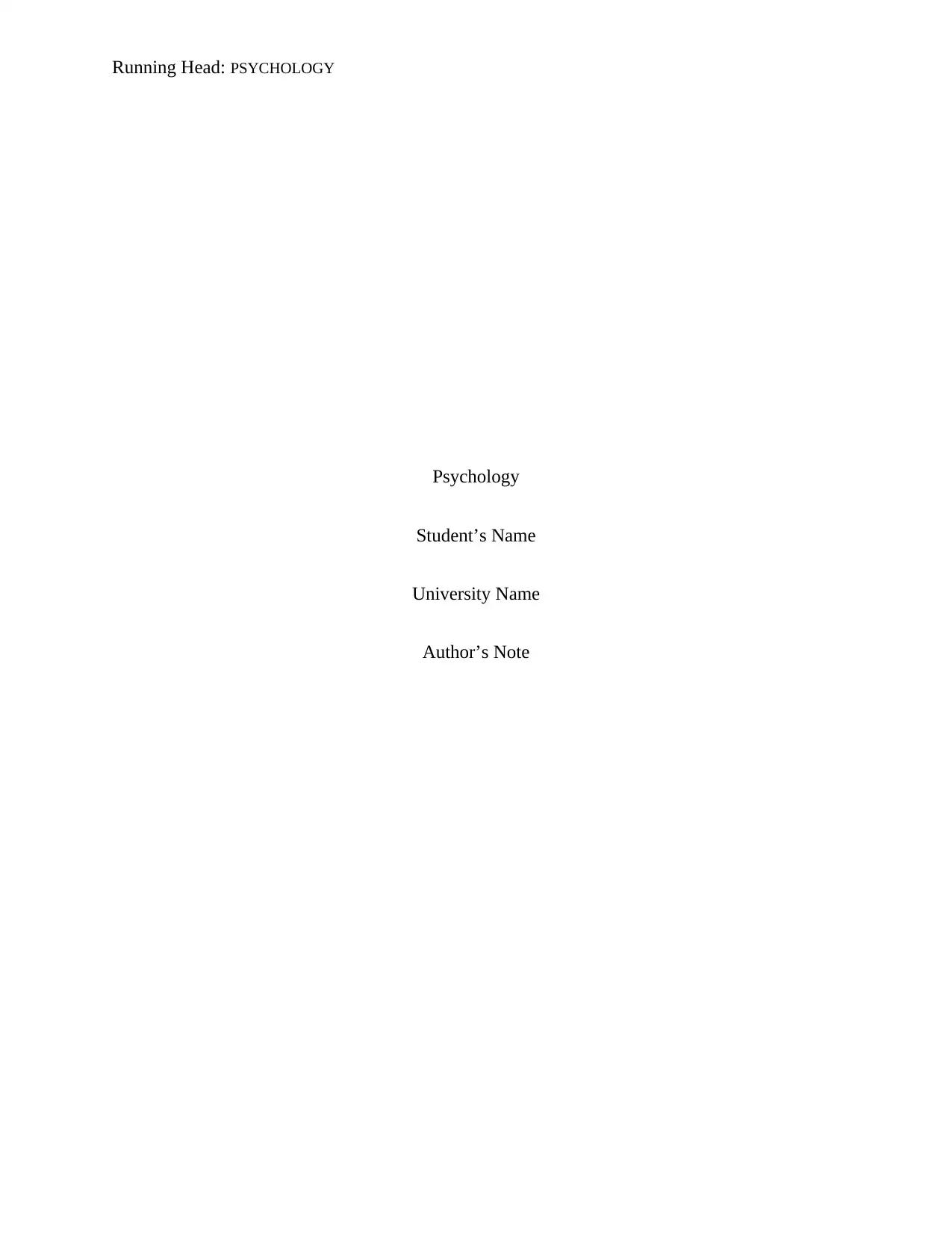
Running Head: PSYCHOLOGY
Psychology
Student’s Name
University Name
Author’s Note
Psychology
Student’s Name
University Name
Author’s Note
Paraphrase This Document
Need a fresh take? Get an instant paraphrase of this document with our AI Paraphraser
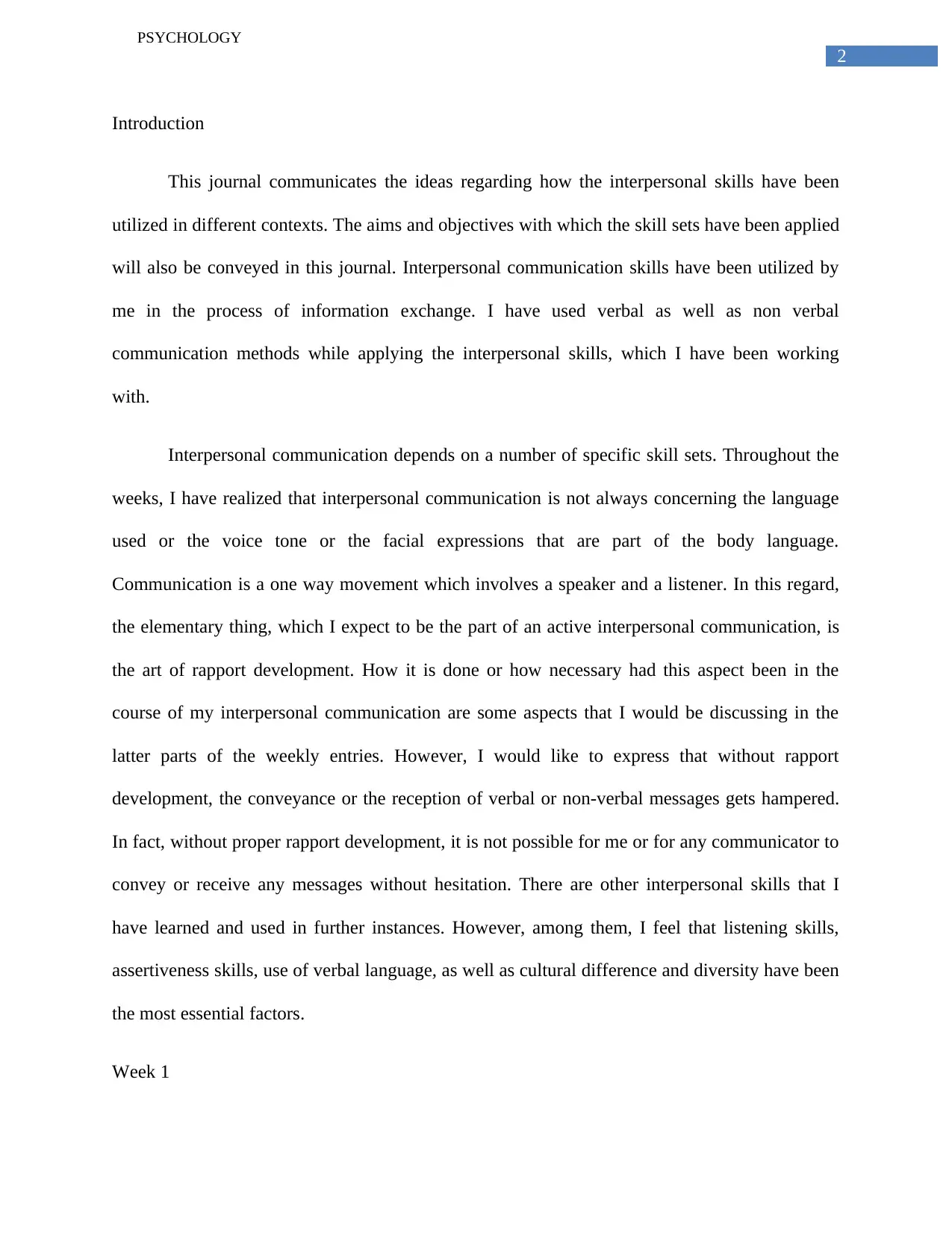
2
PSYCHOLOGY
Introduction
This journal communicates the ideas regarding how the interpersonal skills have been
utilized in different contexts. The aims and objectives with which the skill sets have been applied
will also be conveyed in this journal. Interpersonal communication skills have been utilized by
me in the process of information exchange. I have used verbal as well as non verbal
communication methods while applying the interpersonal skills, which I have been working
with.
Interpersonal communication depends on a number of specific skill sets. Throughout the
weeks, I have realized that interpersonal communication is not always concerning the language
used or the voice tone or the facial expressions that are part of the body language.
Communication is a one way movement which involves a speaker and a listener. In this regard,
the elementary thing, which I expect to be the part of an active interpersonal communication, is
the art of rapport development. How it is done or how necessary had this aspect been in the
course of my interpersonal communication are some aspects that I would be discussing in the
latter parts of the weekly entries. However, I would like to express that without rapport
development, the conveyance or the reception of verbal or non-verbal messages gets hampered.
In fact, without proper rapport development, it is not possible for me or for any communicator to
convey or receive any messages without hesitation. There are other interpersonal skills that I
have learned and used in further instances. However, among them, I feel that listening skills,
assertiveness skills, use of verbal language, as well as cultural difference and diversity have been
the most essential factors.
Week 1
PSYCHOLOGY
Introduction
This journal communicates the ideas regarding how the interpersonal skills have been
utilized in different contexts. The aims and objectives with which the skill sets have been applied
will also be conveyed in this journal. Interpersonal communication skills have been utilized by
me in the process of information exchange. I have used verbal as well as non verbal
communication methods while applying the interpersonal skills, which I have been working
with.
Interpersonal communication depends on a number of specific skill sets. Throughout the
weeks, I have realized that interpersonal communication is not always concerning the language
used or the voice tone or the facial expressions that are part of the body language.
Communication is a one way movement which involves a speaker and a listener. In this regard,
the elementary thing, which I expect to be the part of an active interpersonal communication, is
the art of rapport development. How it is done or how necessary had this aspect been in the
course of my interpersonal communication are some aspects that I would be discussing in the
latter parts of the weekly entries. However, I would like to express that without rapport
development, the conveyance or the reception of verbal or non-verbal messages gets hampered.
In fact, without proper rapport development, it is not possible for me or for any communicator to
convey or receive any messages without hesitation. There are other interpersonal skills that I
have learned and used in further instances. However, among them, I feel that listening skills,
assertiveness skills, use of verbal language, as well as cultural difference and diversity have been
the most essential factors.
Week 1
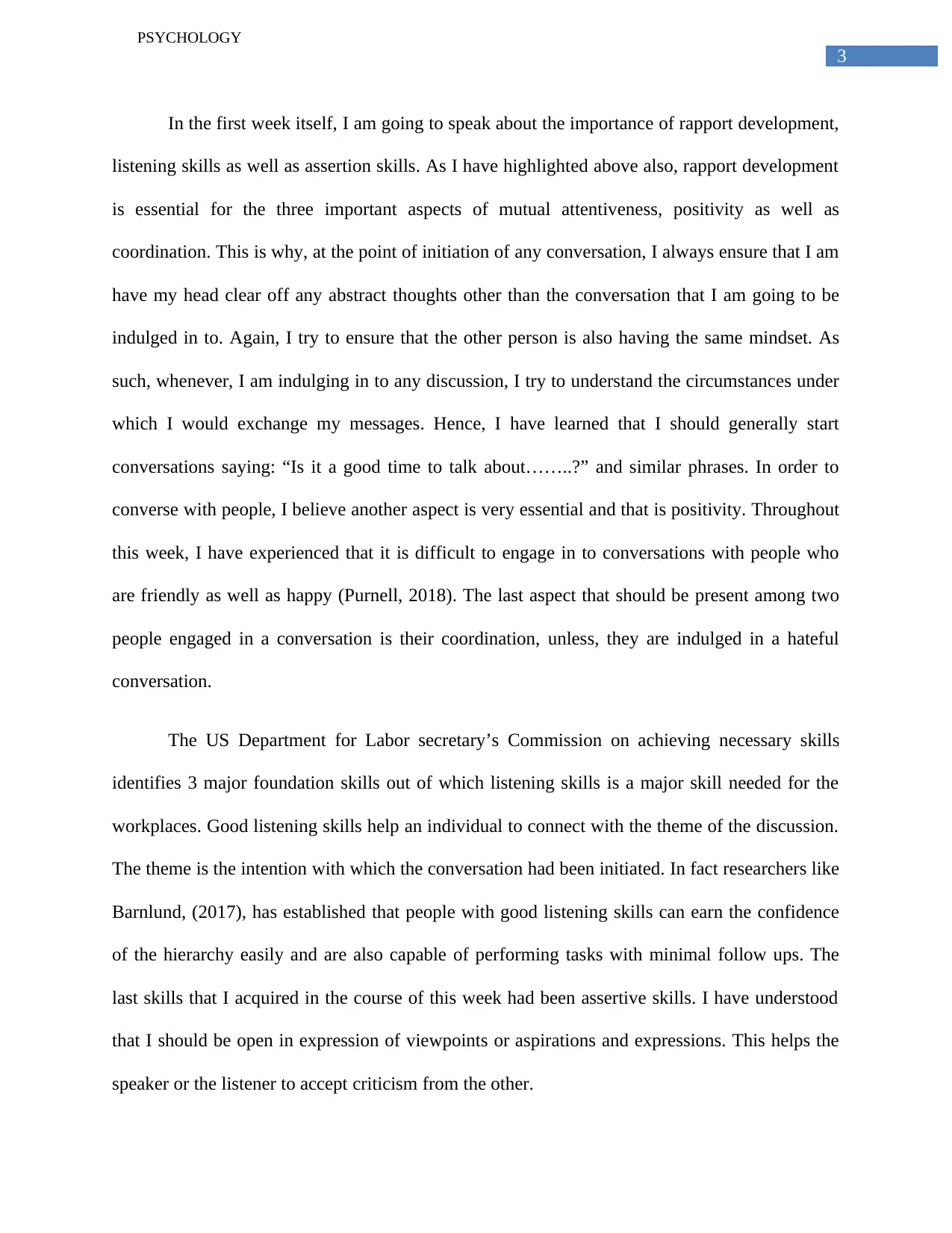
3
PSYCHOLOGY
In the first week itself, I am going to speak about the importance of rapport development,
listening skills as well as assertion skills. As I have highlighted above also, rapport development
is essential for the three important aspects of mutual attentiveness, positivity as well as
coordination. This is why, at the point of initiation of any conversation, I always ensure that I am
have my head clear off any abstract thoughts other than the conversation that I am going to be
indulged in to. Again, I try to ensure that the other person is also having the same mindset. As
such, whenever, I am indulging in to any discussion, I try to understand the circumstances under
which I would exchange my messages. Hence, I have learned that I should generally start
conversations saying: “Is it a good time to talk about……..?” and similar phrases. In order to
converse with people, I believe another aspect is very essential and that is positivity. Throughout
this week, I have experienced that it is difficult to engage in to conversations with people who
are friendly as well as happy (Purnell, 2018). The last aspect that should be present among two
people engaged in a conversation is their coordination, unless, they are indulged in a hateful
conversation.
The US Department for Labor secretary’s Commission on achieving necessary skills
identifies 3 major foundation skills out of which listening skills is a major skill needed for the
workplaces. Good listening skills help an individual to connect with the theme of the discussion.
The theme is the intention with which the conversation had been initiated. In fact researchers like
Barnlund, (2017), has established that people with good listening skills can earn the confidence
of the hierarchy easily and are also capable of performing tasks with minimal follow ups. The
last skills that I acquired in the course of this week had been assertive skills. I have understood
that I should be open in expression of viewpoints or aspirations and expressions. This helps the
speaker or the listener to accept criticism from the other.
PSYCHOLOGY
In the first week itself, I am going to speak about the importance of rapport development,
listening skills as well as assertion skills. As I have highlighted above also, rapport development
is essential for the three important aspects of mutual attentiveness, positivity as well as
coordination. This is why, at the point of initiation of any conversation, I always ensure that I am
have my head clear off any abstract thoughts other than the conversation that I am going to be
indulged in to. Again, I try to ensure that the other person is also having the same mindset. As
such, whenever, I am indulging in to any discussion, I try to understand the circumstances under
which I would exchange my messages. Hence, I have learned that I should generally start
conversations saying: “Is it a good time to talk about……..?” and similar phrases. In order to
converse with people, I believe another aspect is very essential and that is positivity. Throughout
this week, I have experienced that it is difficult to engage in to conversations with people who
are friendly as well as happy (Purnell, 2018). The last aspect that should be present among two
people engaged in a conversation is their coordination, unless, they are indulged in a hateful
conversation.
The US Department for Labor secretary’s Commission on achieving necessary skills
identifies 3 major foundation skills out of which listening skills is a major skill needed for the
workplaces. Good listening skills help an individual to connect with the theme of the discussion.
The theme is the intention with which the conversation had been initiated. In fact researchers like
Barnlund, (2017), has established that people with good listening skills can earn the confidence
of the hierarchy easily and are also capable of performing tasks with minimal follow ups. The
last skills that I acquired in the course of this week had been assertive skills. I have understood
that I should be open in expression of viewpoints or aspirations and expressions. This helps the
speaker or the listener to accept criticism from the other.
⊘ This is a preview!⊘
Do you want full access?
Subscribe today to unlock all pages.

Trusted by 1+ million students worldwide
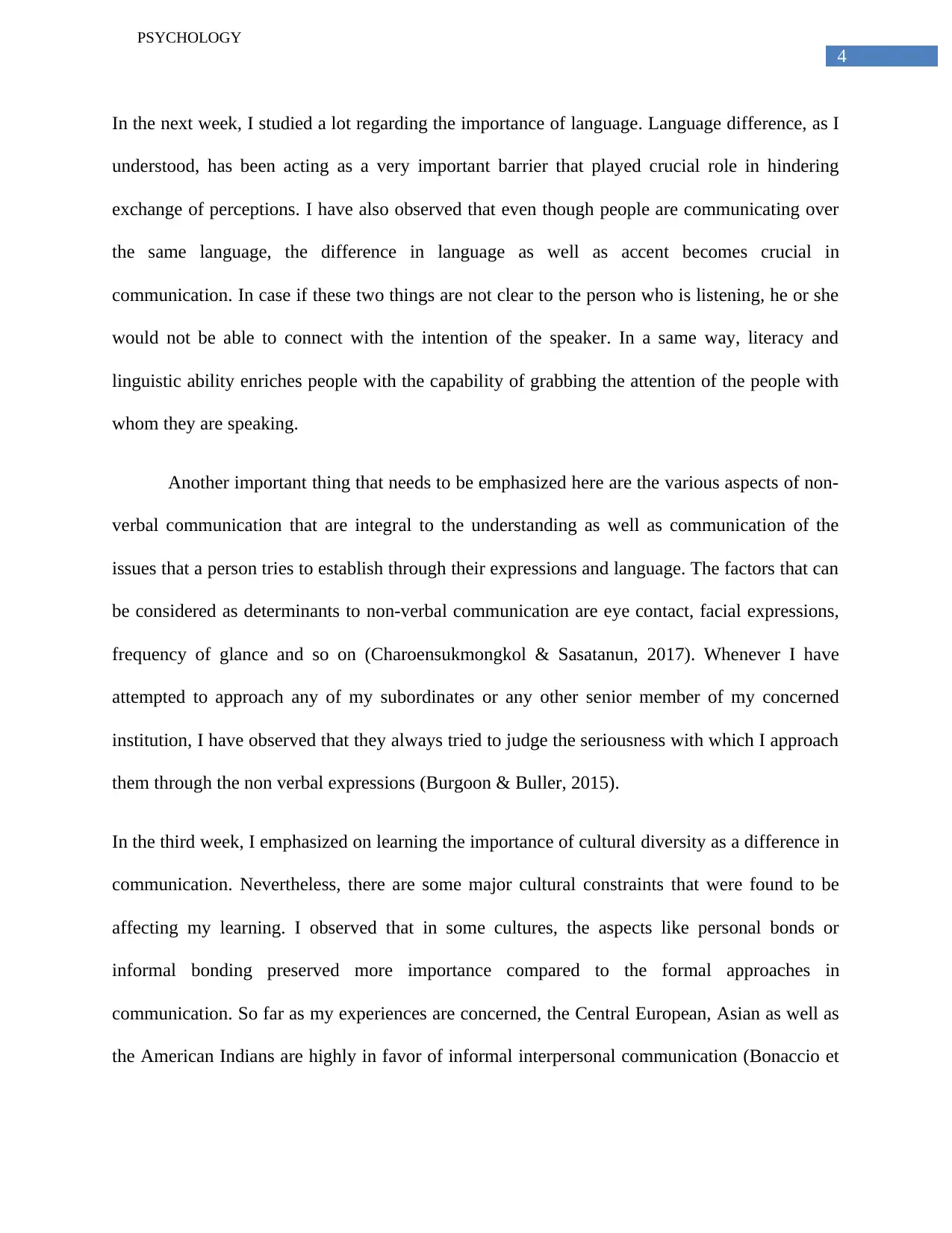
4
PSYCHOLOGY
In the next week, I studied a lot regarding the importance of language. Language difference, as I
understood, has been acting as a very important barrier that played crucial role in hindering
exchange of perceptions. I have also observed that even though people are communicating over
the same language, the difference in language as well as accent becomes crucial in
communication. In case if these two things are not clear to the person who is listening, he or she
would not be able to connect with the intention of the speaker. In a same way, literacy and
linguistic ability enriches people with the capability of grabbing the attention of the people with
whom they are speaking.
Another important thing that needs to be emphasized here are the various aspects of non-
verbal communication that are integral to the understanding as well as communication of the
issues that a person tries to establish through their expressions and language. The factors that can
be considered as determinants to non-verbal communication are eye contact, facial expressions,
frequency of glance and so on (Charoensukmongkol & Sasatanun, 2017). Whenever I have
attempted to approach any of my subordinates or any other senior member of my concerned
institution, I have observed that they always tried to judge the seriousness with which I approach
them through the non verbal expressions (Burgoon & Buller, 2015).
In the third week, I emphasized on learning the importance of cultural diversity as a difference in
communication. Nevertheless, there are some major cultural constraints that were found to be
affecting my learning. I observed that in some cultures, the aspects like personal bonds or
informal bonding preserved more importance compared to the formal approaches in
communication. So far as my experiences are concerned, the Central European, Asian as well as
the American Indians are highly in favor of informal interpersonal communication (Bonaccio et
PSYCHOLOGY
In the next week, I studied a lot regarding the importance of language. Language difference, as I
understood, has been acting as a very important barrier that played crucial role in hindering
exchange of perceptions. I have also observed that even though people are communicating over
the same language, the difference in language as well as accent becomes crucial in
communication. In case if these two things are not clear to the person who is listening, he or she
would not be able to connect with the intention of the speaker. In a same way, literacy and
linguistic ability enriches people with the capability of grabbing the attention of the people with
whom they are speaking.
Another important thing that needs to be emphasized here are the various aspects of non-
verbal communication that are integral to the understanding as well as communication of the
issues that a person tries to establish through their expressions and language. The factors that can
be considered as determinants to non-verbal communication are eye contact, facial expressions,
frequency of glance and so on (Charoensukmongkol & Sasatanun, 2017). Whenever I have
attempted to approach any of my subordinates or any other senior member of my concerned
institution, I have observed that they always tried to judge the seriousness with which I approach
them through the non verbal expressions (Burgoon & Buller, 2015).
In the third week, I emphasized on learning the importance of cultural diversity as a difference in
communication. Nevertheless, there are some major cultural constraints that were found to be
affecting my learning. I observed that in some cultures, the aspects like personal bonds or
informal bonding preserved more importance compared to the formal approaches in
communication. So far as my experiences are concerned, the Central European, Asian as well as
the American Indians are highly in favor of informal interpersonal communication (Bonaccio et
Paraphrase This Document
Need a fresh take? Get an instant paraphrase of this document with our AI Paraphraser
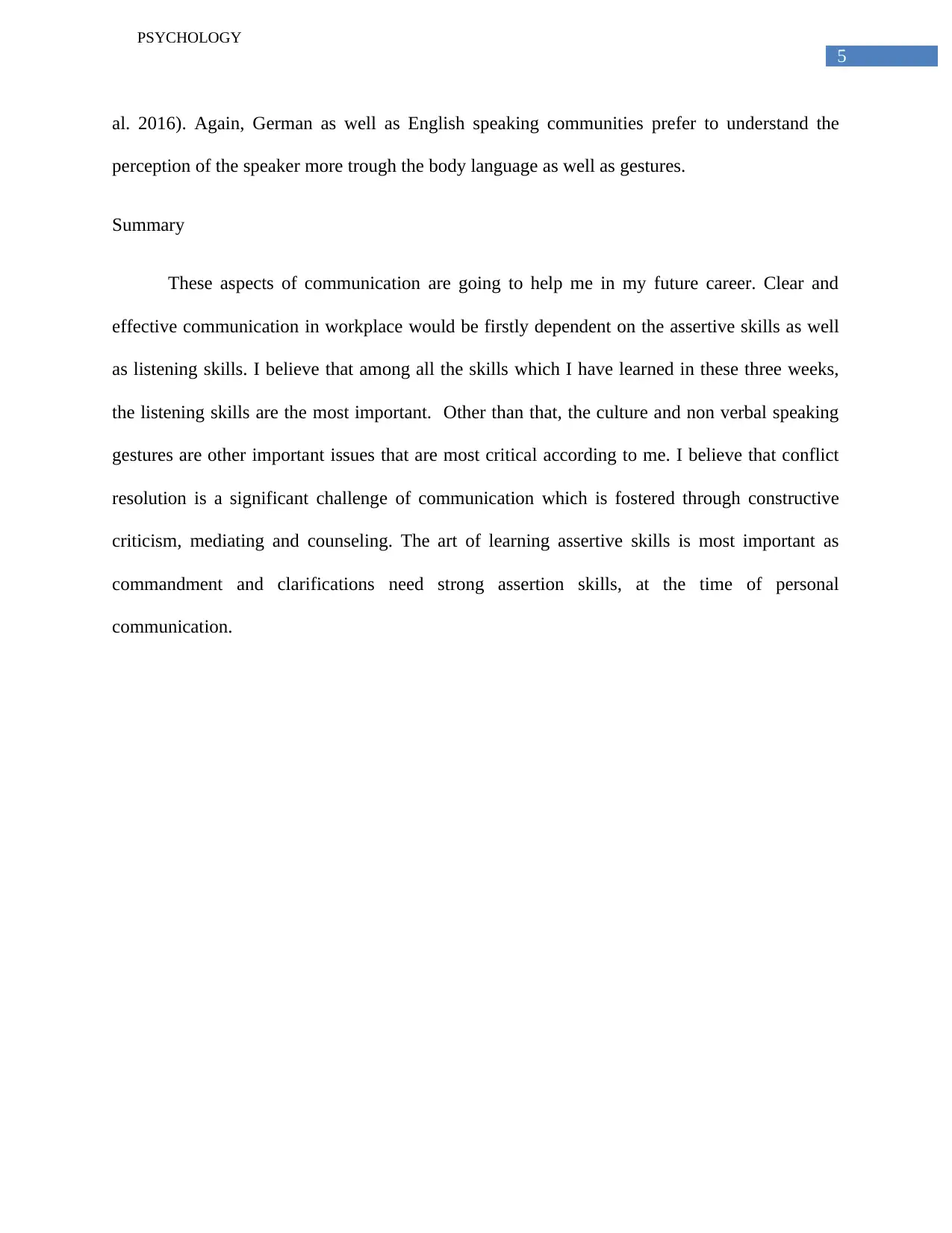
5
PSYCHOLOGY
al. 2016). Again, German as well as English speaking communities prefer to understand the
perception of the speaker more trough the body language as well as gestures.
Summary
These aspects of communication are going to help me in my future career. Clear and
effective communication in workplace would be firstly dependent on the assertive skills as well
as listening skills. I believe that among all the skills which I have learned in these three weeks,
the listening skills are the most important. Other than that, the culture and non verbal speaking
gestures are other important issues that are most critical according to me. I believe that conflict
resolution is a significant challenge of communication which is fostered through constructive
criticism, mediating and counseling. The art of learning assertive skills is most important as
commandment and clarifications need strong assertion skills, at the time of personal
communication.
PSYCHOLOGY
al. 2016). Again, German as well as English speaking communities prefer to understand the
perception of the speaker more trough the body language as well as gestures.
Summary
These aspects of communication are going to help me in my future career. Clear and
effective communication in workplace would be firstly dependent on the assertive skills as well
as listening skills. I believe that among all the skills which I have learned in these three weeks,
the listening skills are the most important. Other than that, the culture and non verbal speaking
gestures are other important issues that are most critical according to me. I believe that conflict
resolution is a significant challenge of communication which is fostered through constructive
criticism, mediating and counseling. The art of learning assertive skills is most important as
commandment and clarifications need strong assertion skills, at the time of personal
communication.
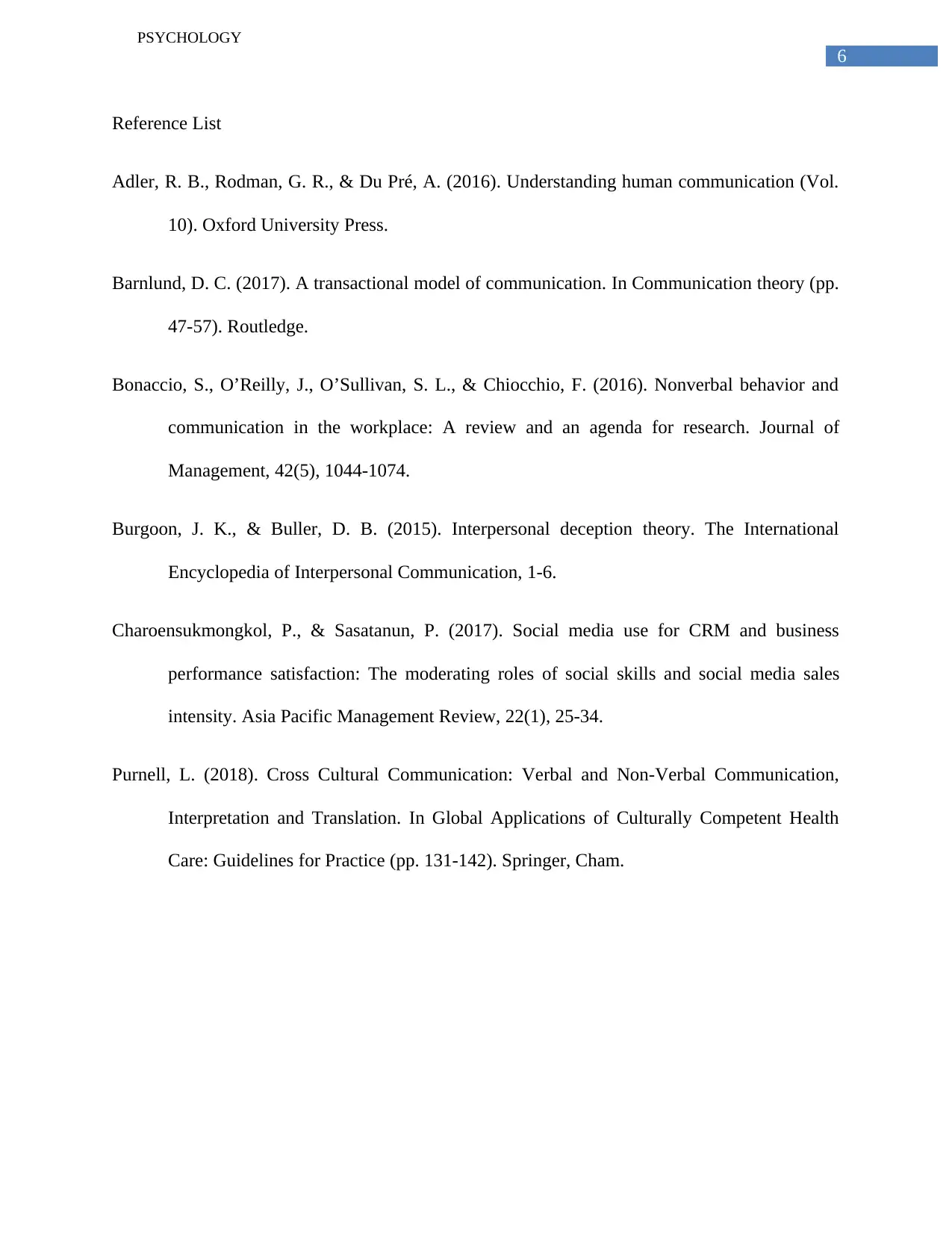
6
PSYCHOLOGY
Reference List
Adler, R. B., Rodman, G. R., & Du Pré, A. (2016). Understanding human communication (Vol.
10). Oxford University Press.
Barnlund, D. C. (2017). A transactional model of communication. In Communication theory (pp.
47-57). Routledge.
Bonaccio, S., O’Reilly, J., O’Sullivan, S. L., & Chiocchio, F. (2016). Nonverbal behavior and
communication in the workplace: A review and an agenda for research. Journal of
Management, 42(5), 1044-1074.
Burgoon, J. K., & Buller, D. B. (2015). Interpersonal deception theory. The International
Encyclopedia of Interpersonal Communication, 1-6.
Charoensukmongkol, P., & Sasatanun, P. (2017). Social media use for CRM and business
performance satisfaction: The moderating roles of social skills and social media sales
intensity. Asia Pacific Management Review, 22(1), 25-34.
Purnell, L. (2018). Cross Cultural Communication: Verbal and Non-Verbal Communication,
Interpretation and Translation. In Global Applications of Culturally Competent Health
Care: Guidelines for Practice (pp. 131-142). Springer, Cham.
PSYCHOLOGY
Reference List
Adler, R. B., Rodman, G. R., & Du Pré, A. (2016). Understanding human communication (Vol.
10). Oxford University Press.
Barnlund, D. C. (2017). A transactional model of communication. In Communication theory (pp.
47-57). Routledge.
Bonaccio, S., O’Reilly, J., O’Sullivan, S. L., & Chiocchio, F. (2016). Nonverbal behavior and
communication in the workplace: A review and an agenda for research. Journal of
Management, 42(5), 1044-1074.
Burgoon, J. K., & Buller, D. B. (2015). Interpersonal deception theory. The International
Encyclopedia of Interpersonal Communication, 1-6.
Charoensukmongkol, P., & Sasatanun, P. (2017). Social media use for CRM and business
performance satisfaction: The moderating roles of social skills and social media sales
intensity. Asia Pacific Management Review, 22(1), 25-34.
Purnell, L. (2018). Cross Cultural Communication: Verbal and Non-Verbal Communication,
Interpretation and Translation. In Global Applications of Culturally Competent Health
Care: Guidelines for Practice (pp. 131-142). Springer, Cham.
⊘ This is a preview!⊘
Do you want full access?
Subscribe today to unlock all pages.

Trusted by 1+ million students worldwide
1 out of 6
Related Documents
Your All-in-One AI-Powered Toolkit for Academic Success.
+13062052269
info@desklib.com
Available 24*7 on WhatsApp / Email
![[object Object]](/_next/static/media/star-bottom.7253800d.svg)
Unlock your academic potential
Copyright © 2020–2026 A2Z Services. All Rights Reserved. Developed and managed by ZUCOL.




